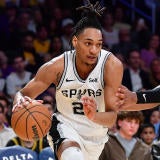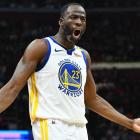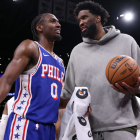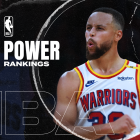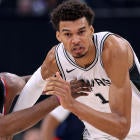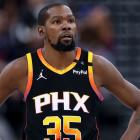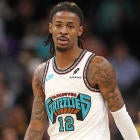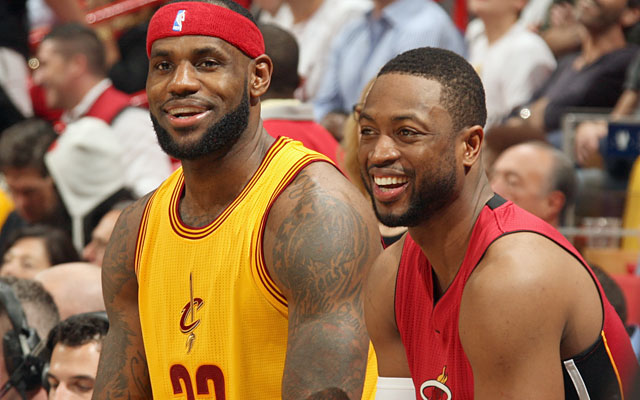
MIAMI -- It's tempting to read too much into this, and we really shouldn't.
OK, we should. And we will.
Did anyone else think it was odd that LeBron James had more camaraderie, more genuine interactions with the former teammates that were all around him on Thursday than with his current ones?
Think about that for a minute. I got here at 3 o'clock for a 5 o'clock game that didn't start until 5:30, so I'm not going anywhere.
Now, when you're the most prominent player in the game and you spend four years with people and make four trips to the NBA Finals with them and win two championships, those bonds "last forever," as James said before his return to Miami on Christmas Day. This is especially true when one of those players, Dwyane Wade, has been your friend and rival -- like a brother to you -- for virtually your entire basketball career.
Those kind of bonds can't be formed in a new city (not even if it's your old city, and not even if it's your hometown) over the course of 28 regular season games.
But man, oh, man, James and his new teammates in the burgundy and gold uniforms look a lot more like strangers than teammates. They're all lost, and nobody has directions.
That's a problem.
It's a problem that cuts much deeper than the inconsequential 101-91 loss that James and the Cavs suffered at the hands of Wade and the Heat on Thursday. And it speaks to something very interesting about the dynamic that James left behind in Miami and the one that he voluntarily rejoined in Cleveland.
The NBA always has been, and always will be, a players' league. The best coaches are the best coaches because they usually have the best players. Carmelo Anthony isn't so great and has virtually no chance to win on any given night because he is surrounded by bad players. That part of the game is easy to figure out.
But there's something else that often gets overlooked, something that we shouldn't need help recognizing after witnessing the championship blueprint set forth by the San Antonio Spurs lo these many years. While it may be true that you can't win without good players, it's equally true that you can't win without a strong, winning culture and foundation.
This was the fundamental reason James left Cleveland in the first place and decided that he needed to be a part of what Pat Riley had built in Miami. More than anything -- more than teaming up with Wade and Chris Bosh, more than flexing his free-agent muscle -- it was about immersing himself in an organization with strong leadership, an unconditional partnership between the coach and the GM and an owner who let those people do their jobs. Four Finals trips and two titles later, it worked -- for all parties involved.
Now, the Heat are below .500 and just trying to tread water in the woeful Eastern Conference. But if you thought that James was going to leave behind a steaming pile of rubble -- a team lacking discipline and any discernable style or direction -- think again.
That's James' new team, the Cleveland Cavaliers.
"Every game for us is a learning experience," James said. "We're not that good right now."
They're 17-11, and once they figure out how to replace the injured Anderson Varejao, chances are they'll walk backwards into the Eastern Conference finals by accident. James is right about not being very good right now, but he missed something.
They don't even seem to know what they're trying to be.
"We should have it figured out by now," a dejected Kevin Love said at his locker.
Have what figured out? What is the Cavs' philosophy? What do they believe in? How are they trying to beat people? From what was on display Thursday afternoon, it appears that they believe in not rotating to protect the basket, not playing with anything remotely resembling togetherness and not running any offense beyond James and Kyrie Irving taking turns going 1-on-5.
The coach of all this, David Blatt, looked as befuddled as I was after the game as he stood before the cameras, microphones and notebooks outside the Cavs' locker room. He spoke vaguely of a lack of discipline and some "little things" that need to be fixed. If by that he meant giving up 44 points in the paint, permitting Birdman Andersen and Udonis Haslem to shoot 7-for-9 combined and Love wandering around the floor like someone who'd mistakenly stumbled into a pickup game he wasn't invited to, I guess he's right.
"We have games like this where the lapses are longer than when we’re playing good basketball," Love said.
James said when he left Miami that this was going to take time, and that his patience was going to be tested. Did he have any idea it would be this much?
Before the game, James was asked if he's ever wondered "what if" about his decision to return home -- as in, what if he'd stayed with Wade and Bosh and taken another run at it? His answer wasn't exactly the "what's done is done" mea culpa that Anthony issued recently about his decision to re-sign with the Knicks, but it was close.
"Oh man, I can’t do that anymore," he said. "Can’t live in the past or live with regrets. I’ve got to live in the future and in the present moment. I don’t know; what do you guys want from me? I go out and play the game of basketball at a high level no matter what uniform I’m in, no matter what city I’m in."
All of this somehow evolved into a reflective monologue from James, who added, "We’ll have one big press conference when I’m done with this thing, and y’all can ask me anything y’all want to. But for now, just try to appreciate what I do on the floor."
And he wasn't finished. At the end of his postgame session with reporters -- after the final horn had sounded and James' long embraces with Wade, Bosh and other former teammates were over -- he posed the following, unprompted:
"The question I have, that's kind of been bothering me sometimes, is when a player decides to decide his own fate, there's always questions about it -- why this guy did that and did this. When an organization decides to go elsewhere for a player, it's, 'They did what's best for the team.' I've got to figure that out sometime."
It's a fair point, and I don't disagree. It's just interesting -- and telling -- that this is what's on James' mind as he tries to navigate the repercussions of his latest free-agent decision. Maybe it'll all work out in the end. Maybe it won't.
Clearly, it's not working out yet. Meanwhile, the stability, discipline, leadership and firm direction that James thrived under for four years in Miami is still here, right where he left it. The talent isn't the same, but all that other stuff doesn't change -- in large part due to Riley, with whom James revealed he hasn't spoken since he left.
"He wants to win, that's first and foremost," James Jones said of Riley. Jones played with James in Miami and now makes cameo appearances with him in Cleveland. Mike Miller made the switch, too, and Ray Allen may yet decide to join them.
They'll all learn this same truth about why some organizations are successful and others aren't.
"You have a lot of owners, you have a lot of people in the building phase," Jones said. "They're always building, building, building. Pat wants to win. He wants to win now, and he wants to win in the future. I think that sets him apart from a lot of organizations."
James was in the winning phase during his four years with Riley and Erik Spoelstra, each a reflection of the other's vision. He's in the building phase again now, and the vision and philosophy -- other than "get LeBron to come back" -- is rather murky, to say the least. Despite all his power, there is only so much one player can do to clarify it.
To answer James' question, there's nothing wrong with players making decisions to perform their craft wherever they like -- as long as we recognize that they're not the only ones who influence how those decisions turn out.


